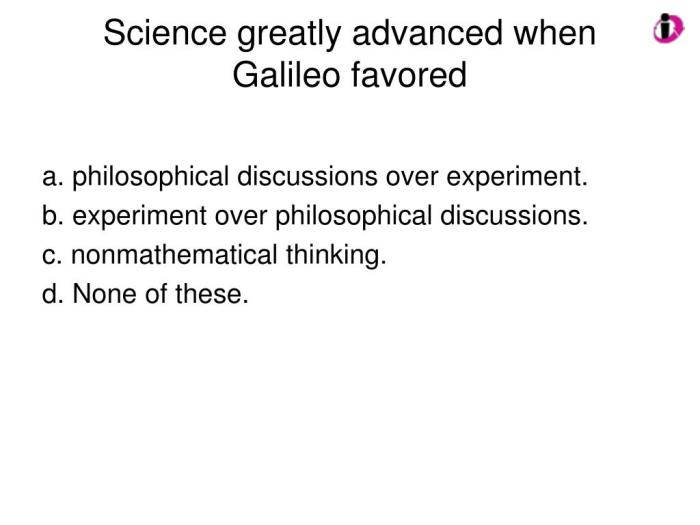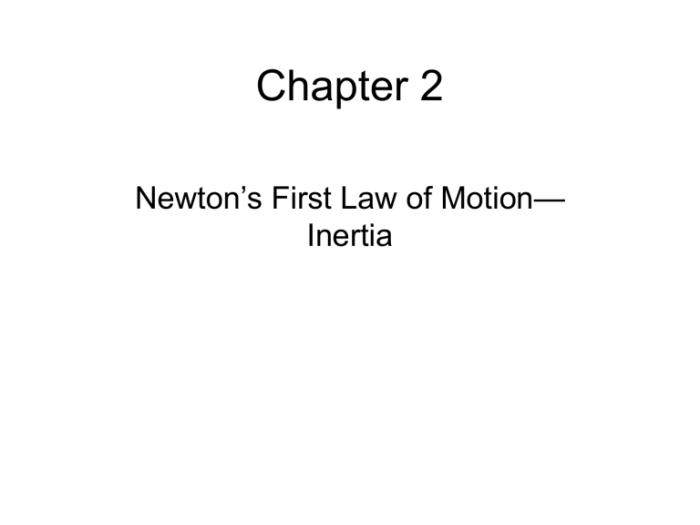Science greatly advanced when Galileo favored a heliocentric model, revolutionizing scientific thought and ushering in an era of unprecedented discovery. Galileo’s groundbreaking experimental approach, coupled with his remarkable discoveries and inventions, laid the foundation for modern science.
Galileo’s pioneering work challenged prevailing scientific views and paved the way for a new understanding of the universe. His legacy continues to inspire and influence scientific inquiry, leaving an enduring mark on the annals of scientific history.
Historical Context: Science Greatly Advanced When Galileo Favored

Before Galileo’s time, the prevailing scientific view was based on the geocentric model, which placed Earth at the center of the universe. This model was proposed by Aristotle and Ptolemy and had been accepted for centuries.
Galileo’s heliocentric model, which placed the Sun at the center of the solar system, was a revolutionary idea that challenged the established scientific orthodoxy. It was based on Galileo’s observations of the moons of Jupiter, the phases of Venus, and the movement of the Earth around the Sun.
Galileo’s Experimental Approach
Galileo’s scientific method involved observation, experimentation, and data analysis. He used the telescope to observe celestial objects and make detailed observations. He also conducted experiments to test his hypotheses and develop mathematical models.
Galileo’s methods were groundbreaking because they emphasized the importance of empirical evidence and quantitative analysis. They helped to establish the scientific method as the foundation of modern science.
Galileo’s Discoveries and Inventions
- Discovered the moons of Jupiter
- Observed the phases of Venus
- Developed the telescope
- Invented the pendulum
Galileo’s discoveries and inventions had a profound impact on science. His observations of the moons of Jupiter provided evidence for the heliocentric model. His invention of the telescope allowed scientists to observe celestial objects in unprecedented detail. And his development of the pendulum led to the invention of the clock, which became an essential tool for scientific research.
Galileo’s Legacy, Science greatly advanced when galileo favored
Galileo’s work had a profound influence on later scientists, including Newton and Kepler. His ideas about the heliocentric model and the scientific method laid the foundation for the development of modern science.
Galileo’s legacy is that of a revolutionary scientist who changed the course of scientific thought. His work helped to establish the scientific method as the foundation of modern science and led to the development of many important scientific discoveries.
Question Bank
How did Galileo’s experimental approach contribute to scientific advancement?
Galileo’s emphasis on observation, experimentation, and data analysis provided a rigorous and empirical basis for scientific inquiry. This approach challenged the prevailing reliance on deductive reasoning and opened the door to new discoveries.
What were some of Galileo’s most significant discoveries?
Galileo’s discoveries included the moons of Jupiter, the phases of Venus, and the law of falling bodies. These discoveries challenged Aristotelian physics and provided evidence in support of the heliocentric model.
How did Galileo’s work influence later scientists?
Galileo’s work laid the groundwork for the scientific method and inspired later scientists, including Newton and Kepler. His ideas about motion and gravity became foundational principles in the development of classical physics.

